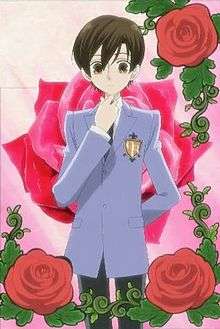Haruhi Fujioka
| Haruhi Fujioka | |
|---|---|
| Ouran High School Host Club character | |
 Haruhi in her male school uniform | |
| First appearance | Volume 1, chapter 1 |
| Created by | Bisco Hatori |
| Voiced by |
Japanese: Maaya Sakamoto (anime; later drama CDs)[1] Aya Hisakawa (early drama CDs) English: Caitlin Glass[2] |
| Portrayed by | Haruna Kawaguchi[3][4] |
| Profile | |
| Relatives |
Ranka Fujioka (father) Kotoko Fujioka (mother) |
| Nationality | Japanese |
Haruhi Fujioka (藤岡 ハルヒ Fujioka Haruhi) is the main protagonist of Ouran High School Host Club, created by Bisco Hatori. In the manga and its adaptations, Haruhi takes on the role of male host despite being of female sex; keeping her sex secret from the host club's female clients. Haruhi's character was positively received, both because of her fluid gender and her down-to-earth personality.
Character

At the start of the Ouran High School Host Club manga and anime, Haruhi enters the prestigious Ouran Academy on a scholarship. Looking for a quiet place to study, she stumbles upon the school's male-only host club, where she was initially mistaken for a boy due to her short hair and gender-neutral clothing. After knocking over a highly expensive vase, the club forces her to work away her debt. Having a "low perception of gender", Haruhi joins the club as a host, keeping her sex secret from the club's clientele.[6]
At the beginning of the story, Haruhi disliked being forced to work for the host club. However, as the plot advances, Haruhi slowly grows less introverted, and starts to realize the boys of the host club have become her best friends who are helping her learn and grow as a better person.[7] The chapters consist of comedic explorations of shoujo clichés and gender performance. Unlike other shoujo heroines that Ouran High School Host Club parodies, Haruhi is an independent, hard-working asocial character who embraces a genderqueer or "gender-ambivalent" identity.[8]
Development
Caitlin Glass, the English voice actress of Haruhi, has noted that the character is both among her most challenging and her favorite roles. In an interview with Swerve, she described how difficult it was to "believably [be] a boy [while] still appealing even to a male audience." Taking the dual role of director and lead character, Glass said she felt like she had "something to prove" and, initially, she was under great pressure.[9]
Reception
Afro Samurai of IGN listed Haruhi among his 25 "greatest anime characters". Stating that while the reverse harem genre of anime had been "done to death" by the time Ouran High School Host Club anime was released, Haruhi's character went against the established tropes of the genre. Described as "super tomboyish, demure, and not at all moe," Haruhi is considered a good contrast to the eccentric cast of rich boys.[10] In an anime review, IGN's D.F. Smith praised both Caitlin Glass and Maaya Sakamoto for their performance as Haruhi in their respective languages, reporting that it is a "tricky role".[11] Sakamoto was nominated for a Seiyu Award in 2007 for her portrayal of Haruhi.[12]
Rose Bridges of Anime News Network lauded Haruhi as one of the "freshest elements" of the anime. Comparing Haruhi to Tohru Honda from Fruits Basket and Tsukushi Makino from Boys Over Flowers because of her strong sense of empathy and her "take-no-crap" attitude respectively, Bridges praised the character for her intelligence, ability to speak her mind and her "blasé approach to gender roles."[13]
Writing for The Mary Sue, Alenka Figa listed Haruhi at the top of her top 5 genderqueer characters in anime. Noting that plots based on gender confusion are common in anime, Figa states that the trope was subverted quickly when Haruhi admits to her gender-blindness in the first episode.[6] Aja Romano of The Daily Dot pointed Haruhi out as one of the "rare cases" where a character in an anime embraces a genderqueer or "gender-ambivalent" identity, refusing to return to what she described as "safely heteronormative territory."[8]
References
- ↑ "Ouran High School Host Club". Ryu. Retrieved 2008-05-01.
- ↑ "Funimation Announces Ouran High School Host Club Cast". Anime News Network. 2008-07-04. Retrieved 2009-04-11.
- ↑ Komatsu, Mikikazu (2015-10-10). "Yumio Kobayashi's "Nigakute Amai" Comedy Manga Gets Live-Action Film Adaptation". Crunchyroll.
- ↑ "One Direction: Song Used For Japanese Movie 'Say I Love You!". KDrama Stars. 2014-06-24.
- ↑ Sherman, Jennifer (2011-12-08). "Miwa to Sing Ouran High School Host Club Film's Theme". Anime News Network.
- 1 2 Figa, Alenka (2015-02-01). "The Top 5 Queer Voices in Anime and Manga". The Mary Sue.
- ↑ Elawar, Zac (2012-10-19). "Ouran High School Host Club Series Collection Review". Capsule Computers.
- 1 2 Romano, Aja (2014-04-08). "When it comes to transgender representation, anime has room to grow". The Daily Dot.
- ↑ Regina, Steven. "No Glass Ceiling". The Swerve Magazine.
- ↑ Afro Samurai (2014-02-04). "Top 25 greatest anime characters". IGN.
- ↑ D.F. Smith (2007-10-23). "IGN: Ouran High School Host Club Season 1 - Part 1 Review". IGN.
- ↑ 各部門ランキング 中間発表 (in Japanese). Seiyu Awards. Archived from the original on 2007-01-16.
- ↑ Bridges, Rose (2015-09-02). "The Secret Revolution of Ouran High School Host Club". Anime News Network.
External links
- Official Ouran High School Host Club manga website (Japanese)
- Official NTV Ouran High School Host Club anime website (Japanese)
- Official Funimation Ouran website